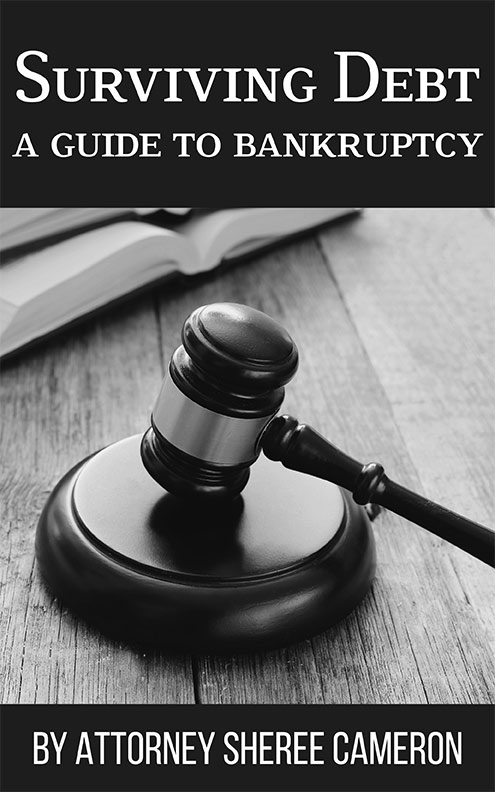Bankruptcy guarantee Raleigh today

Top family-run bankruptcy law office Raleigh right now? GENERALLY creditors do not actually repossess (or repo) a vehicle until you are 3 or more months behind in payments. They cannot break into a garage or harm any of your personal property (such as a chain around the axle) while repossessing the vehicle. Once repossessed, they must give any personal property that was in the vehicle back to you if you request it — but beware. Some will charge storage fees, or charge to get the personal property out of the vehicle for you. Many times they will claim there was no personal property in the vehicle — and you will be hard pressed to prove there was personal property stored there. It is nearly ALWAYS best not to leave personal property in any vehicle that could get repossessed (repo’ed)!
Harvest Your Capital Losses: If you own stocks that have lost money, you can sell them and deduct up to $3,000 on your federal taxes. Just be careful not to violate the wash-sale rule, which would disallow the deduction. This rule states you cannot purchase the same or a substantially similar stock within 30 days before or after the sale. “Some people think it’s OK if I do it using two accounts,” Zollars says. They may think they can sell a stock from a taxable account and then immediately purchase similar securities in an IRA. However, this is not allowed. “That’s not the way the rule works,” he says.
In Chapter 7 Bankruptcy, the immediate impact of filing bankruptcy is that all collection efforts are stopped by a Federal Court Order called a stay. The IRS is included in this stay. The only way a collector can overcome the automatic stay while your bankruptcy case is still open is to apply to the Bankruptcy Court for relief from stay. Judges will rarely lift a stay for the IRS, unless the IRS can prove some kind of fraud is being perpetrated by the bankrupt taxpayer. Unfortunately, the statute of limitations for collections runs only while a person is not in bankruptcy. If the bankruptcy is not finished (discharged), the tax bill will not age for purposes of the statutes of limitations. If you go into bankruptcy and emerge from the process still owing the IRS, it gives the IRS extra time to collect the balance. This often happens if the Taxpayer has some, but not all, of their taxes erased in a Chapter 7. As a result, many taxpayers end up filing a “Chapter 20,” wherein they first file a Chapter 7 to eliminate what tax can be eliminated and then file a Chapter 13 to deal with what is left. The IRS can have a total of ten years to collect taxes, penalties, and interest. Once a bankruptcy case is over, the IRS gets whatever time remained on the original ten years, plus the time the bankruptcy case was pending-plus an additional six months to collect the remaining debt (if any). Chapter 7 cases will add about 4 months to this. See even more information on bankruptcy lawyer Raleigh.
Student loan interest paid by you or someone else: In the past, if parents or someone else paid back a student loan incurred by a student, no one got a tax break. To get a deduction, the law said that you had to be both liable for the debt and actually pay it yourself. But now there’s an exception. You may know that you might be eligible to take a deduction but even if someone else pays back the loan, the IRS treats it as though they gave you the money, and you then paid the debt. So, a student who’s not claimed as a dependent can qualify to deduct up to $2,500 of student loan interest paid by you or by someone else.
We want you to feel secure with Sheree as your attorney in your Chapter 7 bankruptcy or Chapter 13 bankruptcy. Sheree is a Board Certified Consumer Bankruptcy Specialist. We have an “A+” BBB® rating. Sheree has 18+ years of experience as a debtor bankruptcy lawyer in Raleigh, NC. We have the best Google Testimonials (click here) in North Carolina! And not least, our two money-back GUARANTEES! Legally we cannot offer any guaranteed outcome in any bankruptcy case. We do offer a return of attorney’s fees if a case is dismissed (see below). JFYI, we have never had to do this! If we do not think you can receive a discharge in Chapter 7 or 13 bankruptcy, we will not take your case! Can we be fairer than that? See extra information at https://www.cameronbankruptcylaw.com/. We treat you like family, We have the best bankruptcy reviews in North Carolina!
Surrender the property – Give the property back to the creditor (“surrender”) and have the debt discharged. If you choose to surrender property, you generally must comply within 45 days of filing your Statement of Intention (which is generally filed as part of your bankruptcy petition). Creditors will generally contact you to facilitate return of collateral, and many times it is not worth their effort to collect the property. If you are surrendering a car, however, we do recommend that you contact the creditor and make arrangements to drop off the vehicle.